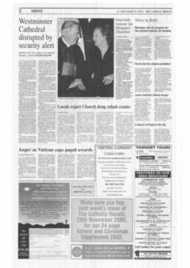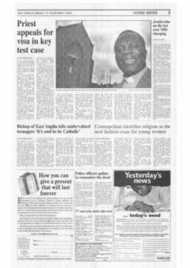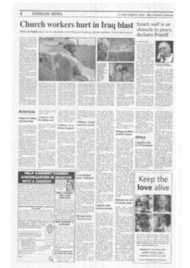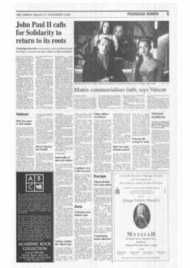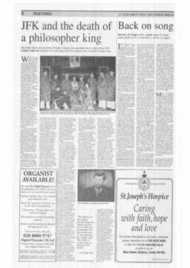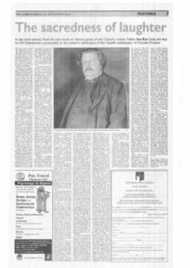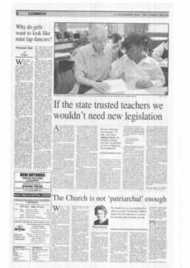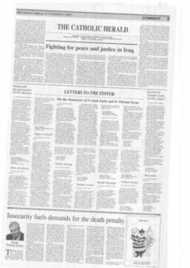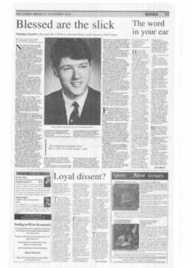Page 7, 21st November 2003
Page 7

Report an error
Noticed an error on this page?If you've noticed an error in this article please click here to report it.
Tags
Share
Related articles
By Staff Reporter
A Chesterton Biography That Will Last Generations
Chesterton: Faithful To The Child He Used To Be
'gk' A Prince Of Authors
The Everlasting Man Returns
The sacredness of laughter
In the third extract from his new book on literary giants of the Catholic revival, Father Ian Ker finds the key to GK Chesterton's personality in the author's admiration of the 'beatific buffoonery' of Charles Dickens
I_ s GK Chesterton a major English writer? Today he is generally regarded as a minor novelist and short . story writer — and an even more minor poet — who happened also to be a significant literary biographer and critic, particularly of Dickens. His works of political and religious controversy would not normally be regarded as of any special literary interest.
However, there is another way of looking at Chesterton's literary achievement which has gone by default, and that is to admit that the author of the Father Brown stories and even of The Man Who Was Thursday (1907), his best novel, is indeed a fairly slight figure, but on the other hand to sec the non-fiction prose writer, the Chesterton who wrote such studies as Charles Dickens (1906), The Victorian Age in Literature (1913), and St Thomas Aquinas (1933), as well as the apologetic classics Orthodox)) (1908) and The Everlasting Man (1925), as a successor to the great Victorian "sages" or "prophets," who was indeed often compared to Dr Johnson in his own lifetime, and who can be mentioned without exaggeration in the same breath as Carlyle, Ruskin, Arnold, and especially, of course, Newman.
Thus, Chesterton's classic study of Dickens should not only have established him as a creative literary critic, comparable to the very greatest English critics — perhaps because he was writing about the novel rather than poetry this has not been sufficiently recognised — but it should also be seen as revealing his literary genius and originality in a way that none of his novels do. As he frankly admits in his Autobiography (1936): -... I could not be a novelist; because I really like to see ideas or notions wrestling naked, as it were, and not dressed up in a masquerade as men and women." He adds, however: "But I could be a journalist because 1 could not help being a controversialist" Charles Dickens not only constitutes a literary achievement that Chesterton never surpassed, or even equalled, in any of his other books, but it is the book which reveals most luminously both the sense in which Chesterton is a Catholic writer and why conversion to Catholicism was the natural and inevitable outcome of his progression from the vague Unitarianism in which he had been brought up. It is a typical Chestertonian paradox that, while on the one hand Dickens was nothing if not ignorant of and prejudiced against Catholicism as well as the middle ages, on the other hand it is his unconsciously Catholic and medieval ethos and imagination that are at the heart of Chesterton's critical study.
I said that Charles Dickens is probably Chesterton's greatest work the work in which more than in any other he expressed his own self and his philosophy of life — and the book that explains most clearly and fully his Catholicism — bis Roman Catholicism — and the sense in which he is a Catholic writer in his most creative works. As I also pointed out, the book is built on the paradox that outwardly Dickens was as far from Catholicism as any Englishman can be.
Chesterton emphasises this fact. When in Italy, Dickens never really left England, or rather, "Dickensland": "The great foreign things which lie in wait for us in the south of Europe", such as the Catholic Church, he never "really felt".
Paradoxically again, Chesterton could not really regret it, as Dickens "could only have understood them by ceasing to be the inspired cockney that he was". In one of his Appreciations and Criticisms of the Works of Charles Dickens • (1911), Chesterton remarks that "when he found a thing in Europe which he did not understand, such as the Roman Catholic Church, he simply called it an old-world superstition, and sat looking at it like a moonlit ruin." Because Dickens had, in spite of this, what Chesterton conceived of as a naturally Catholic spirit, he could not bring himself to condemn that innocent ignorance which enabled Dickens, for example, to criticise "the backwardness and idleness of Catholics who would not build a Birmingham in Italy," while seemingly "quite unconscious of the obvious truth, that the backwardness of Catholics was simply the refusal of Bob Cratchit to enter the house of Gradgrind."
Chesterton's own primary — religious — experience, that wonder at the unexpectedness of the ordinary world, is for him the outstanding feature of Dickens's novels. But whereas the scene of the childhood experiences was also London, it was a very different city from the comfortable mid dle-class world of Chesterton's happy childhood. One might have thought that the environment of Dickens's miserable childhood could hardly have evoked wonder, let alone gratitude. Nevertheless it was during the nightmare of "drudging" at the blacking factory that the young Dickens "drifted over half London" and discovered those streets that "for him ever .afterwards ... were mortally romantic; they were dipped in the purple dyes of youth and its tragedy", and yet "rich with irrevocable sunsets" Unlike Chesterton, who had good reason for delighting in the fact of life in his boyhood, Dickens could be said to belong to those "higher optimists" whose joy is in inverse proportion to their grounds for so rejoicing; for these "do not approve of the universe; they do not even admire the "universe; they fall in love with it. They embrace life too close to criticise or even to see it. Existence to such men has the wild beauty of a woman, and those love her with most mienshy who love her with least cause".
Unlike Chesterton, then, the evil and pain of life did not come later but formed part of Dickens's boyish experience. For those early years of misery -gave him many moral and mental wounds, from which
he never recovered". Nevertheless "the practical depression of his life at this time did nothing to prevent him from laying up those hilarious memories of which all his books are made". And so it was the co-existence of these two fundamental aspects of life, which for Chesterton was the inevitable 'basis of a Christian conception of the world, that was also at the heart of Dickens's genius as a novelist: "He was delighted at the same moment that he was desperate. The two opposite things existed in him simultaneously, and each in its full strength. His soul was not a mixed colour like guy and purple, caused by no component colour being quite itself. His soul was like a shot silk of black and crimson, a shot silk of misery and joy."
From one of these two points of view, the exaggeration of Dickens's caricatures only reflects the fact that their creator knew "what it is to feel a joy so vital and violent that only impossible characters can express that". No other novelist "encouraged his characters so much as Dickens". Just as Catholic Christianity — unlike Calvinism — says that any man could be a saint if he chose", so Dickens believed in the "encouraging of any body to be anything". So much so that, although he "tried to make some of his people appear dull people ... he could not keep them dull". Even in Scrooge Chesterton finds "a heartiness in his inhospitable sentiments that is akin to humour and therefore to humanity", for there "glows" through him "the great furnace of real happiness ... that great furnace, the heart of Dickens."
That this allusion to the heart of Dickens has a quasireligious resonance — an echo of the Sacred Heart of Jesus— should not surprise us, for Chesterton attributes divinity to the creativity of Dickens: "One of the godlike things about Dickens is his quantity, his quantity as such, the enormous output, the incredible fecundity of his invention." But like the divine Creator, Dickens does not create cardboard characters; they have the same sort of relation to him as human creatures to God; they are dependent on him, but they are not puppets: "He is not come, as a writer, that his creatunss may copy life and copy its narrowness; he is come that they may have life, and that they may have it more abundantly." And like God, he loves and values even his most unattractive creations, like Mr Toots: "He makes us not only like. but love, not only love, but reverence this little dunce and cad. The power to do this is a power truly and literally to be called divine." Because Dickens "conceives an endless joy" in conceiving his immortal creations, he is "close to popular religion, which is the ultimate and reliable religion". That this popular religion is Catholicism is made plain a few pages later, when Chesterton speaks of how the "fragments" and "the wrecks of that enormous religion", the huge popularity of Dickens, have entered into the ordinary English language spoken by people who may never have opened a novel by Dickens — "just as Catholics can live in a tradition of Christianity without having looked at the New Testament".
The Catholicism. if one may call it that, of the world of Dickens is not confined to the goodness of creation. There is also the sheer holiness of creation, which Chesterton finds most strikingly in a type of character quite unknown to the Protestant culture of Victorian England, but familiar to the Catholic (and even more the Orthodox) tradition: the socalled "holy fool". Chesterton himself uses the word of Miss Podsnap in Our Mutual Friend, who "is, like Toots, a holy fool". These holy fools, like the Misses Pecksniff in Martin Chuz4evvii, are certainly not treated with solemn reverence, otherwise they would be cardboard characters, as the characters Dickens "tried to treat unsmilingly and grandly" are the very characters who are not human: "Dickens had to make a character humorous before he could make it human ... when once he has laughed at a thing it is sacred for ever". The secret, Chesterton even claims, of the "humble characters", of "the great characters of Dickens is that they are all great fools," a "great fool" being someone "who is above wisdom rather than below it." And the fool is defined not just in Christian, but in Catholic terms: "The present that each man brings in hand is his own incredible personality. In the most sacred sense and in the most literal sense of the phrase, he 'gives himself away'. Now, the man who gives himself away does the last act of generosity; he is like a martyr, a lover, or a monk. But he is almost certainly what we commonly call a fool."
It is, of course, the affinity that Chesterton feels for Dickens that provides him with the perfect medium that enables him to express his own sense of wonder at the world as he was never able to do so exuberantly in his other prose writings, or even in his novels or verse. Recognising that Dickens like himself belonged to the "brotherhood" of journalism, he notes how "some of the best work that Dickens ever did, better than the work in his best novels, can be found in these slight and composite scraps of journalism". And this overflowing creative power is likened to "the virtue of a saint" which "is said to be shown in fragments of his property or rags from his robe". The "vision of a monstrous magazine, entirely written by Himself ', which "floated before him", was conceived, Chesterton imagined, "as a kind of vast multiplication of himself, with Dickens as editor opening letters, Dickens as leader-writer writing leaders, Dickens as reporter reporting meetings, Dickens as reviewer reviewing books, Dickens, for all I know, as office-boy opening and shutting doors". Now in this comic evocation of Dickens's unremitting energy Chesterton is himself expressing not only his own characteristic comic genius but also his own "incomparable hunger and pleasure for the vitality and the variety, for the infinite eccentricity of existence", a craving which he attributes to Dickens, but in so doing actually enacts his own extraordinary sense of the wonder of existence. We recognise Dickens, perhaps as never before, but the words are not, could not be, Dickens's; they are pure Chesterton.
Dickens's delight at the extraordinary unexpectedness of life, at the "wild and utterly unexplained" character of the world ("It is the best of all impossible worlds"), contains what was for Chesterton the fundamental religious perspective: "It is, perhaps, the strongest mark of the divinity of man that he talks of this world as 'a strange world', though he has seen no other." Dickens transforms the commonplace because it is not commonplace to him; for him life is not normal or ordinary
but "eccentric": "This sentiment of the grotesqueness of the universe ran through Dickens's brain and body like the mad blood of the elves. He saw all his streets in fantastic perspectives, he saw all his cockney villas as top heavy and wild, he saw every man's nose twice as big as it was, and every man's eyes like saucers. This explains how Dickens could express "with an energy and brilliance quite uncommon the things close to the common mind", that mind which is "common to the saint and the sinner, to the philosopher and the fool". This quality of "commonness" was what Dickens "grasped and developed" — both in his humour and his horror, which were deeply human because "they belong to the basic part of us, below the lowest roots of our variety". This ability both "to make the flesh creep and to make the sides ache" reflected the Christian view of creation as inherently good but terribly damaged by evil. Thus, on the one hand, Dickens's humour sprang from the hope and joy that constitute an "exhilaration" that is simply "mystical" or "infinite": "A joke can be so big that it breaks the roof of the stars. By simply going on being absurd, a thing can become godlike; there is but one step from the ridiculous to time sublime." But, on the other hand, as well as Dickens's "beatific Buffoonery", there was also another kind of "exhilaration" which Dickens shared with the Catholicism of the Middle Ages, "that amazingly healthy period when even the lost spirits were hilarious" — in the creation of such evil characters as Quilp whose "atrocious hilarity" makes him want to "hurt peepie in the same hearty way that a good-natured man desires to help them". And just as Dickens's Victorian limitations prevented him from appreciating or understanding Roman Catholicism and the Middle Ages, so too Chesterton doubts if, "in the kindly rationalism of his epoch, he kept any belief in a personal devil in his theology, but he certainly created a personal devil in every one of his books".
The symbol of the grotesque gargoyle is a deliberate reference to the Catholic Middle Ages, as Chesterton saw Dickens as — unconsciously — totally mediaeval in his attitude to life, a view he expounds in one of the most amusingly penetrating pas
sages in Charles Dickens: "Upon him descended the real tradition of 'Merry England', and not upon the pallid mediaevalists who thought they were reviving it. The PreRaphaelites, the Gothieists, the admirers of the Middle Ages, had in their subtlety and sadness the spirit of the present day. Dickens had in his buffoonery and bravery the spirit of the Middle Ages. He was much more mediaeval in his attacks on mediaevalism than they were in their defences of it ... He cared as little for mediaevalism as the rnediaevals did. He cared as much as they did for lustiness and virile laughter ... He would have been very much bored by Ruskin and Walter Pater if they had explained to him the strange sunset tints of Lippi and Botticelli. He had no pleasure in looking on the dying Middle Ages. But he looked on the living Middle Ages, on a piece of the old uproarious superstition still unbroken; and he hailed it like a new religion. The Dickens characters ate pudding to an extent at which the modem mediaevalists turned pale. They would do every kind of honour to an old observance, except observing it. They would pay to a Church feast every sort of compliment except feasting."
In Chesterton's eyes Dickens belongs to Merry not Puritan, England because, albeit unconsciously, he believed in the same "trinity of eating, drinking and praying" and "the holy day which is really a holiday," just like the authors of the Canterbury Tales and The Path to Rome, for whom religion was a part of ordinary daily life as it had not been in England since the Reformation. And the vision with which Chesterton ends his great critical work, that tells us at least as much about Chesterton as it does about Dickens, is of an eternal inn where we shall enjoy the heavenly banquet of which the sacrament of the Eucharist is the pledge: "And all roads point at last to an ultimate inn, where we shall meet Dickens and all his characters: and when we drink again it shall be from the great flagons in the tavern at the end of the world."
The Catholic Revival in English Literature by Father Ian Ker will be available from Gracewing (tel. 01568 616835) later this month, priced 1114.99
blog comments powered by Disqus



